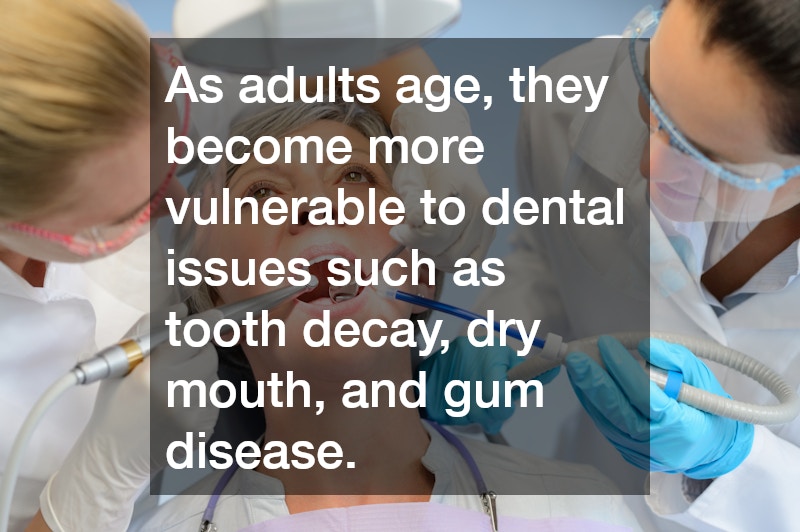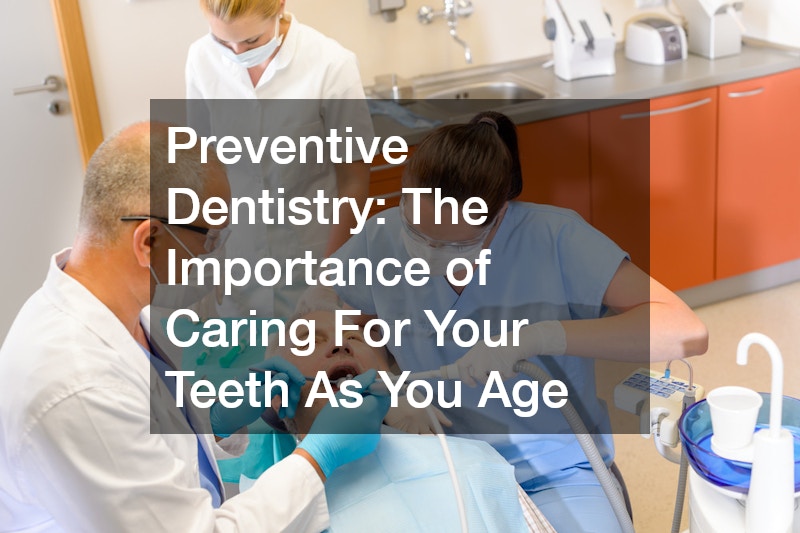
Preventive Dentistry: The Importance of Caring For Your Teeth As You Age
As we journey through life, preventive dentistry becomes an essential part of maintaining our overall health, particularly when it comes to the well-being of our teeth and gums. Preventive dentistry encompasses all the practices that help to avoid dental problems, ensuring that oral health is preserved, especially as we age. This article will delve into the key impacts of aging on dental health, the best preventive practices for the elderly, and how diet and lifestyle can influence oral health in older adults.
How Does Aging Affect Dental Health?
The Impact of Aging on Gums and Teeth
Aging naturally affects the gum tissue, often resulting in conditions such as receding gums, where the gum line gradually wears away, exposing more of the tooth. The process of gum recession can lead to increased sensitivity and a higher likelihood of root decay, necessitating diligent oral care and preventive measures.
Similarly, enamel erosion is a significant concern as we get older, due to years of exposure to acids and wear and tear from chewing and lifestyle factors. This erosion can weaken the teeth, making them more susceptible to cavities, chips, and cracks, which highlights the importance of preventive approaches.
Moreover, the cumulative effects of a lifetime of dental habits—both good and bad—manifest prominently in senior years, emphasizing the need for consistent preventive care tailored to the aging population. Statistics show that nearly two-thirds of adults aged 65 and older suffer from gum disease, underscoring the widespread nature of these issues.
Common Dental Problems in Older Adults
As adults age, they become more vulnerable to dental issues such as tooth decay, dry mouth, and gum disease. Tooth decay remains prevalent among the older population, primarily due to factors like systemic diseases and the widespread use of medications that can reduce saliva flow.
Dry mouth is another common issue, often caused by medications or underlying health conditions, that exacerbates the risk of cavities and oral infections. A healthy flow of saliva is crucial for neutralizing acids and washing away food particles, thus its reduction poses a significant challenge for maintaining oral health.
Furthermore, gum disease, especially periodontal disease, often develops or worsens with age due to the body’s reduced immune response. Regular dental visits and proper oral hygiene are vital in managing these conditions, as untreated gum disease can lead to tooth loss and other serious health concerns.
What Are the Best Preventive Practices for Elderly Oral Care?
Routine Dental Check-Ups
Routine dental check-ups play a critical role in the prevention of dental problems, allowing for early detection and treatment of issues before they escalate. Regular dentist visits provide an opportunity for professional cleanings, which remove plaque and tartar that cannot be effectively managed through normal brushing and flossing alone.
Moreover, during these check-ups, dentists can offer valuable guidance on maintaining oral health, ranging from hygiene tips to dietary advice. Preventive care also involves tracking any developments or changes in the mouth that may indicate potential concerns, ensuring comprehensive management of oral health.
Engaging in proactive dental appointments not only helps preserve the structural integrity of teeth and gums but also supports overall health, as many systemic diseases have oral manifestations. For older adults, consistent dental visits are not just recommended but essential for fostering long-term oral wellness.
Home Oral Hygiene Tips for Seniors
Effective home oral care is paramount for seniors, and it involves using age-appropriate techniques and tools. Seniors should consider using electric toothbrushes with soft bristles, which can be easier on sensitive gums while still effectively removing plaque.
Interdental cleaners, such as floss or water flossers, are critical for maintaining the health of the gum line and preventing interdental cavities. These tools cater to the needs of older adults who may have difficulty using traditional dental floss due to arthritis or limited hand dexterity.
Fluoride toothpaste remains an important component in reinforcing tooth enamel, aiding in the prevention of decay. Staying vigilant with daily brushing and interdental cleaning can significantly deter the development of common dental issues faced by seniors.
How Can Diet and Lifestyle Influence Oral Health in Older Adults?
The Role of Nutrition in Dental Health
Nutrition plays an instrumental role in supporting oral health, with certain foods promoting strong teeth and healthy gums. A diet rich in calcium and vitamin D is vital for maintaining bone density and tooth strength, while adequate intake of vitamin C is necessary for gum health.
Conversely, limiting the consumption of sugary foods and acidic beverages can protect against tooth decay and enamel erosion. As taste buds evolve with age, seniors might develop cravings for sweets, increasing the risk for dental caries without proper dietary management.
Given these factors, older adults should focus on balanced meals that include fruits, vegetables, lean proteins, and whole grains, all of which contribute to overall dental health. By strategically choosing nourishment that supports oral well-being, seniors can mitigate many age-related dental issues.
Lifestyle Tips for Maintaining a Healthy Smile
Beyond diet, maintaining a healthy lifestyle is crucial for preserving a radiant smile well into one’s later years. Quitting smoking is particularly vital, as tobacco use is linked with an increased risk of oral cancers, gum disease, and tooth loss.
Staying hydrated ensures optimal saliva production, a natural defense against oral health problems, as saliva helps to cleanse the mouth by washing away food particles. Seniors should aim to drink plenty of water throughout the day to counteract the drying effects of medications and age-related changes.
Incorporating regular physical activity and stress management techniques also benefits oral health indirectly by boosting immune function and reducing inflammation. Seniors who adopt a holistic approach to their lifestyle can enhance both their general and dental well-being, enjoying vibrant health throughout their golden years.
Conclusion
Preserving dental health through preventive dentistry is a cornerstone of healthy aging, ensuring that individuals can enjoy both functional and aesthetic benefits well into their senior years. A comprehensive strategy that combines regular dental check-ups, tailored home care practices, nutritional awareness, and a healthy lifestyle is most effective in addressing the challenges posed by aging on oral health.
The aging process presents unique challenges to maintaining dental health, but through diligent care and preventive strategies, seniors can mitigate many common issues associated with this stage of life. By committing to a regimen of preventive dentistry, aging individuals not only protect their teeth but also enhance their quality of life.

